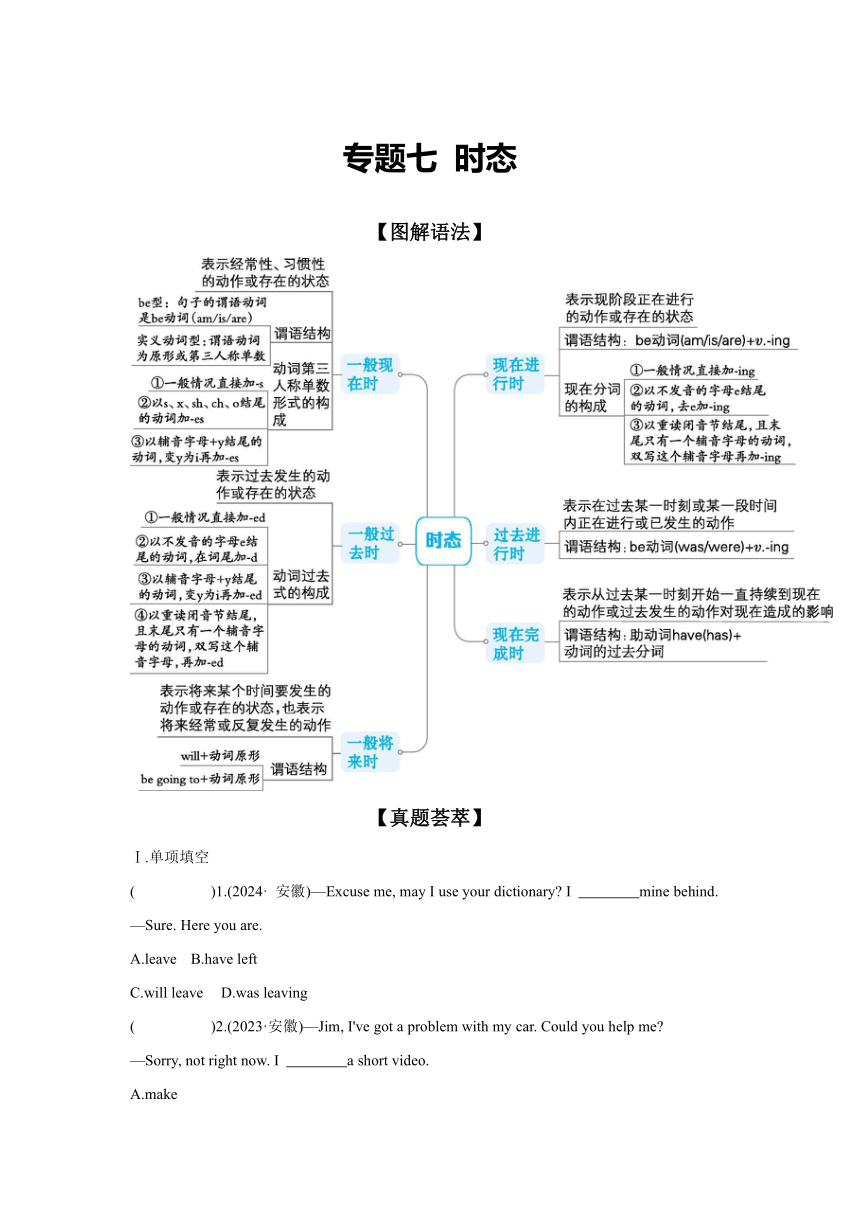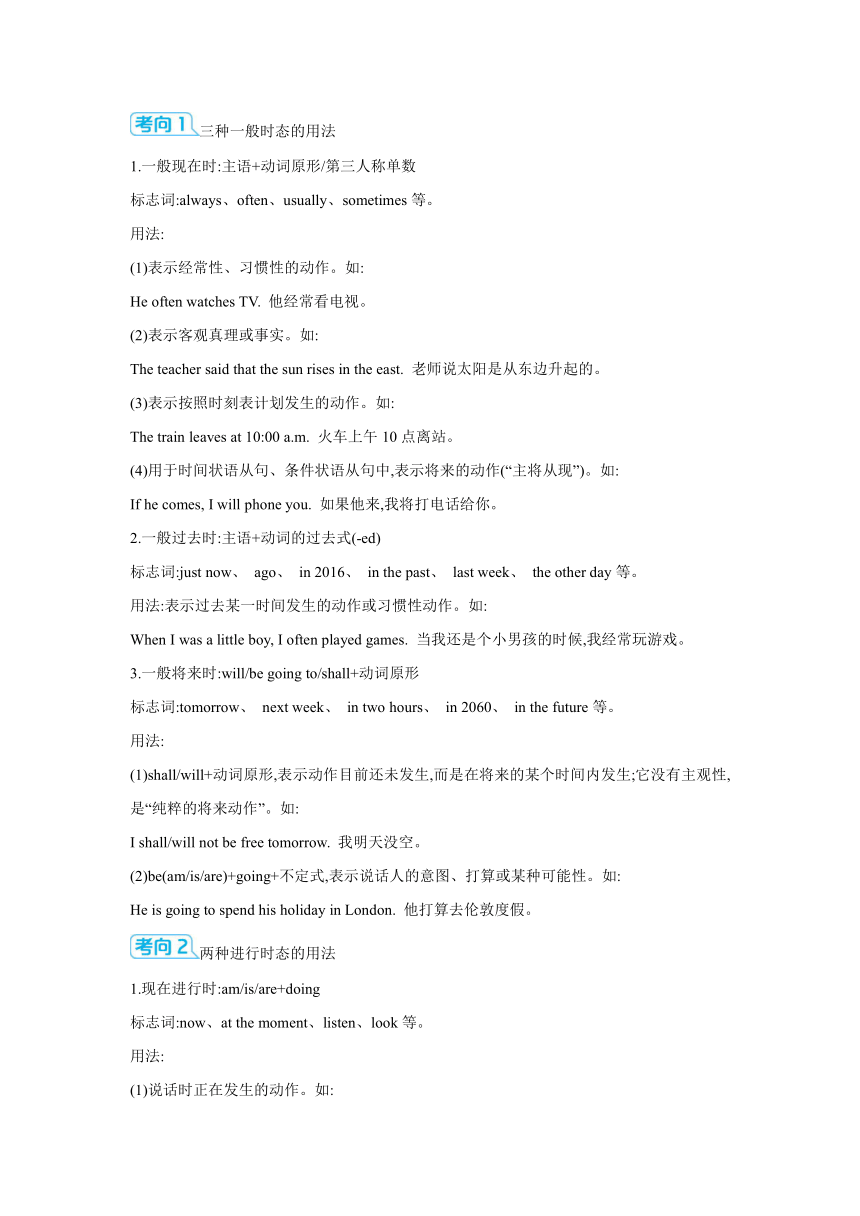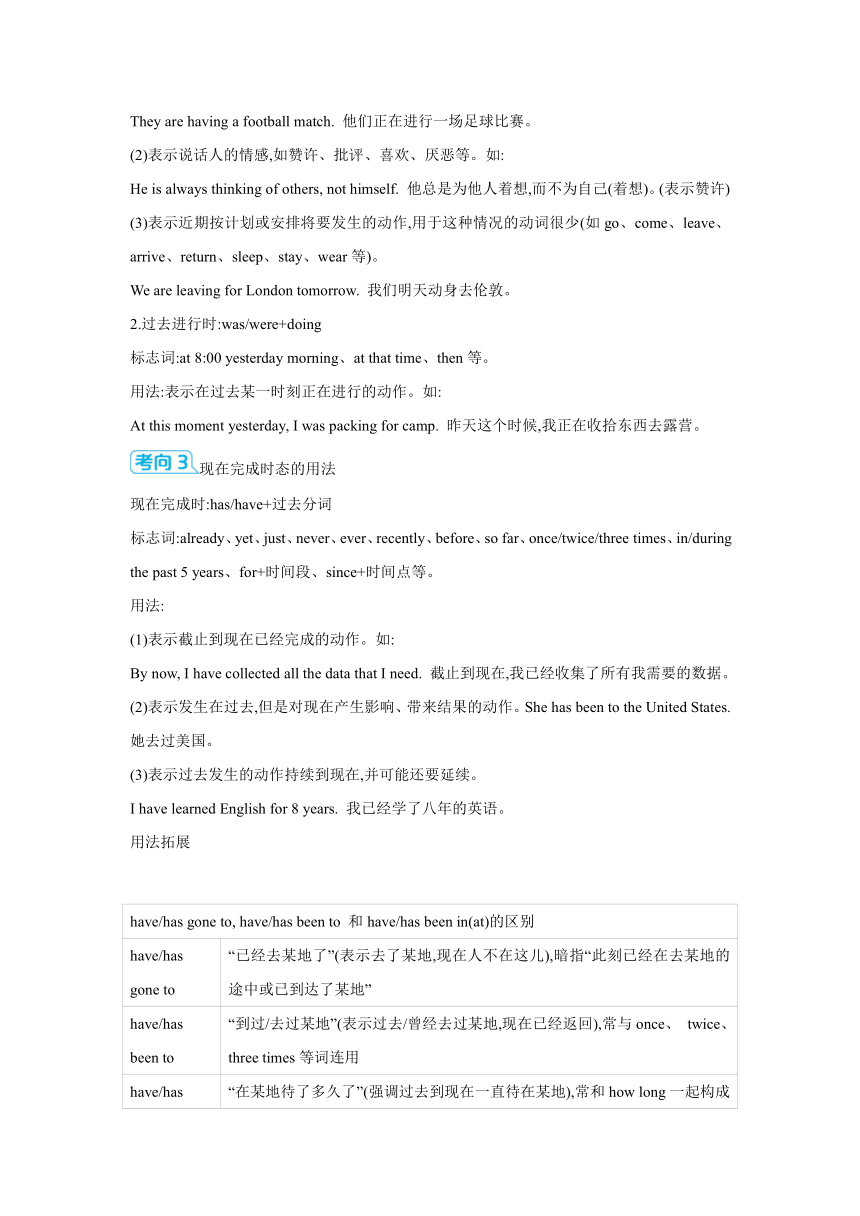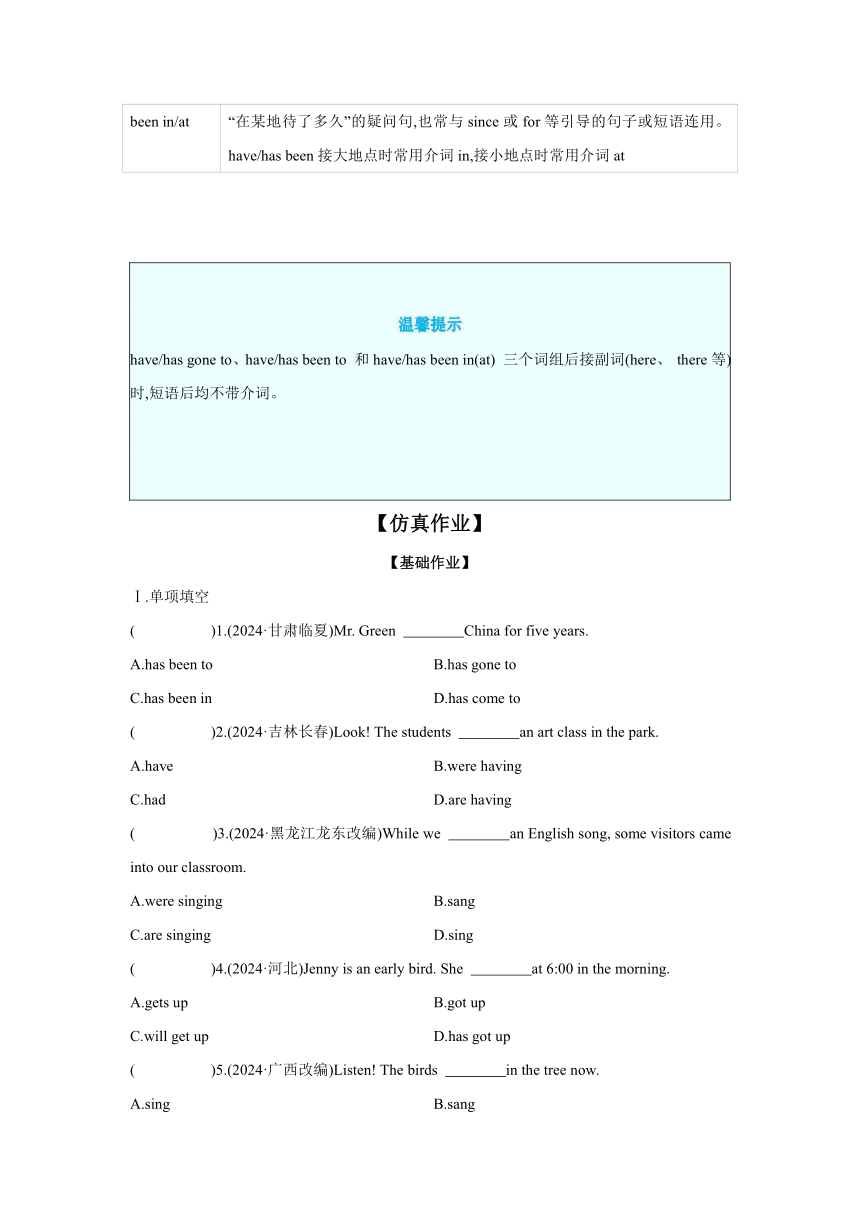专题7 时态 2025年中考英语总复习专题训练(安徽专版)(含解析)
文档属性
| 名称 | 专题7 时态 2025年中考英语总复习专题训练(安徽专版)(含解析) |  | |
| 格式 | docx | ||
| 文件大小 | 254.5KB | ||
| 资源类型 | 教案 | ||
| 版本资源 | 通用版 | ||
| 科目 | 英语 | ||
| 更新时间 | 2024-11-01 21:00:15 | ||
图片预览





文档简介
专题七 时态
【图解语法】
【真题荟萃】
Ⅰ.单项填空
( )1.(2024· 安徽)—Excuse me, may I use your dictionary I mine behind.
—Sure. Here you are.
A.leave B.have left
C.will leave D.was leaving
( )2.(2023·安徽)—Jim, I've got a problem with my car. Could you help me
—Sorry, not right now. I a short video.
A.make
B.have made
C.am making
D.was making
( )3.(2024·安徽)—What are you saving money for
—Father's Day is around the corner. I a gift for my father.
A.am going to buy
B.have bought
C.bought
D.was buying
( )4.(2023·安徽)—Our computer is working again!
—Yes.Our IT teacher it.It took him about an hour.
A.has fixed B.will fix
C.is fixing D.was fixing
( )5.(2022·安徽)—The air here is much fresher than before.
—Exactly! We a lot of trees in the past few years.
A.planted
B.were planting
C.have planted
D.will plant
( )6.(2019·安徽)—It's ten years since we came here.
—How time flies! We in China for so long.
A.work
B.worked
C.will work
D.have worked
Ⅱ.单词拼写
(2024· 安徽)The Shenzhou-17 team h (交) over their work to the Shenzhou-18 team on April 30th.
【知识清单】
三种一般时态的用法
1.一般现在时:主语+动词原形/第三人称单数
标志词:always、often、usually、sometimes等。
用法:
(1)表示经常性、习惯性的动作。如:
He often watches TV. 他经常看电视。
(2)表示客观真理或事实。如:
The teacher said that the sun rises in the east. 老师说太阳是从东边升起的。
(3)表示按照时刻表计划发生的动作。如:
The train leaves at 10:00 a.m. 火车上午10点离站。
(4)用于时间状语从句、条件状语从句中,表示将来的动作(“主将从现”)。如:
If he comes, I will phone you. 如果他来,我将打电话给你。
2.一般过去时:主语+动词的过去式(-ed)
标志词:just now、 ago、 in 2016、 in the past、 last week、 the other day等。
用法:表示过去某一时间发生的动作或习惯性动作。如:
When I was a little boy, I often played games. 当我还是个小男孩的时候,我经常玩游戏。
3.一般将来时:will/be going to/shall+动词原形
标志词:tomorrow、 next week、 in two hours、 in 2060、 in the future等。
用法:
(1)shall/will+动词原形,表示动作目前还未发生,而是在将来的某个时间内发生;它没有主观性,是“纯粹的将来动作”。如:
I shall/will not be free tomorrow. 我明天没空。
(2)be(am/is/are)+going+不定式,表示说话人的意图、打算或某种可能性。如:
He is going to spend his holiday in London. 他打算去伦敦度假。
两种进行时态的用法
1.现在进行时:am/is/are+doing
标志词:now、at the moment、listen、look等。
用法:
(1)说话时正在发生的动作。如:
They are having a football match. 他们正在进行一场足球比赛。
(2)表示说话人的情感,如赞许、批评、喜欢、厌恶等。如:
He is always thinking of others, not himself. 他总是为他人着想,而不为自己(着想)。(表示赞许)
(3)表示近期按计划或安排将要发生的动作,用于这种情况的动词很少(如go、come、leave、arrive、return、sleep、stay、wear等)。
We are leaving for London tomorrow. 我们明天动身去伦敦。
2.过去进行时:was/were+doing
标志词:at 8:00 yesterday morning、at that time、then等。
用法:表示在过去某一时刻正在进行的动作。如:
At this moment yesterday, I was packing for camp. 昨天这个时候,我正在收拾东西去露营。
现在完成时态的用法
现在完成时:has/have+过去分词
标志词:already、yet、just、never、ever、recently、before、so far、once/twice/three times、in/during the past 5 years、for+时间段、since+时间点等。
用法:
(1)表示截止到现在已经完成的动作。如:
By now, I have collected all the data that I need. 截止到现在,我已经收集了所有我需要的数据。
(2)表示发生在过去,但是对现在产生影响、带来结果的动作。She has been to the United States. 她去过美国。
(3)表示过去发生的动作持续到现在,并可能还要延续。
I have learned English for 8 years. 我已经学了八年的英语。
用法拓展
have/has gone to, have/has been to 和have/has been in(at)的区别
have/has gone to “已经去某地了”(表示去了某地,现在人不在这儿),暗指“此刻已经在去某地的途中或已到达了某地”
have/has been to “到过/去过某地”(表示过去/曾经去过某地,现在已经返回),常与once、 twice、 three times等词连用
have/has been in/at “在某地待了多久了”(强调过去到现在一直待在某地),常和how long一起构成“在某地待了多久”的疑问句,也常与since或for等引导的句子或短语连用。have/has been接大地点时常用介词in,接小地点时常用介词at
have/has gone to、have/has been to 和have/has been in(at) 三个词组后接副词(here、 there等)时,短语后均不带介词。
【仿真作业】
【基础作业】
Ⅰ.单项填空
( )1.(2024·甘肃临夏)Mr. Green China for five years.
A.has been to B.has gone to
C.has been in D.has come to
( )2.(2024·吉林长春)Look! The students an art class in the park.
A.have B.were having
C.had D.are having
( )3.(2024·黑龙江龙东改编)While we an English song, some visitors came into our classroom.
A.were singing B.sang
C.are singing D.sing
( )4.(2024·河北)Jenny is an early bird. She at 6:00 in the morning.
A.gets up B.got up
C.will get up D.has got up
( )5.(2024·广西改编)Listen! The birds in the tree now.
A.sing B.sang
C.are singing D.will sing
( )6.(2024·吉林改编)Look! The students in Class One a class meeting.
A.will have B.are having
C.had D.have
( )7.(2024·黑龙江绥化改编)He will be much healthier if he enough exercise in his free time.
A.take B.takes
C.will take D.took
( )8.(2024·江苏连云港)As a Chinese traditional martial art (武术), Taijiquan to more than 150 countries all over the world so far.
A.spreads B.is spreading
C.will spread D.has spread
( )9.(2024·江苏扬州)Since I was born, my family in the same flat.
A.live B.will live
C.are living D.have lived
( )10.(2024·江苏无锡)Hey, John! What's up I a shower when you called.
A.had taken B.have taken
C.was taking D.am taking
Ⅱ.单词拼写
1.(2024·甘肃白银改编)Have you ever t (尝试) Chinese food outside China
2.(2024·黑龙江龙东改编)The teacher told us that the earth t (移动) around the sun.
3.(2024·江苏苏州改编) I have i (邀请) the whole class of children, so no one feels unhappy.
4.(2024·四川遂宁改编)Boys and girls, work hard! I believe you will s (成功) in the exam.
5.(2024·甘肃临夏改编) We v (参观) the Great Wall last summer vacation.
【提高作业】
Ⅰ.单项填空
( )1.(2024·安庆二模)—I called you last night, but you didn't answer.
—Oh, sorry. My mobile phone was kept off because I the TV program Model Ⅶ.
A.have watched B.was watching
C.am watching D.will watch
( )2.(2024·淮南二模)—Another three astronauts travelled into space in April, 2024.
—Yeah. How wonderful! Our country great progress in space technology by now.
A.will make B.made
C.has made D.was making
( )3.(2024·蚌埠二模)—Telling a few friends about our goal can help us stick to it.
—Yes. Though we fail to follow through, we shy either.
A.don't feel B.haven't felt
C.won't feel D.weren't feeling
( )4.(2024·合肥包河区一模)—Would you like something to drink
—No, thanks. I some tea and I'm not thirsty now.
A.have drunk B.was drinking
C.drink D.will drink
( )5.(2024·安庆一模)—Congratulations, boys and girls! You all great progress in the past three years.
—Dear teachers, we will never forget you and your help.
A.make B.are making
C.will make D.have made
( )6.(2024·合肥二模)—How wonderful! On April 10, 2024, China's 40th Antarctic expedition (考察队) successfully completed its mission and all returned to China.
—Yeah. They us a lot when they stayed there.
A.showed B.are showing
C.will show D.have showed
( )7.(2024·合肥二模)—I can't find Dad anywhere. Do you know where he is
—He his car outside the house.
A.will wash B.had washed
C.has washed D.is washing
( )8.(2024·合肥包河区二模)—I saw Mr. Black just now. Surprisingly, he's in good health now.
—Yeah, he a lot, but he has given it up.
A.smokes B.smoked
C.will smoke D.is smoking
( )9.(2024·合肥庐江二模)—We another person about the changes in our school. Do you have any suggestions
—You can go to Mr. Wu. He knows the school well.
A.interviewed
B.will interview
C.were interviewing
D.have interviewed
( )10.(2024·安庆二模)—Jerry, what are these carrots and potatoes used for
—I them for our parents for e and join me.
A.cook B.cooked
C.will cook D.have cooked
Ⅱ.单词拼写
1.(2024·合肥庐江一模)Mike has offered much help to Judy since she b (开始) to learn physics.
2.(2024·合肥庐江一模)A stranger offered Mary a ride on the street, but she r (拒绝) in a proper way.
3.(2024·合肥蜀山区一模)We believe that hard work c (创造) history and makes a hopeful future.
4.(2024·合肥瑶海区一模)He d (开车) very carefully to keep everyone safe last week.
5.(2024·芜湖二模)After hard work, Miss Yang r (实现) her dream.
【素养作业】
Ⅰ.单项填空
( )1.—Tom, would you mind not playing the piano Your sister her speech for the English class now.
—Oh, sorry, Dad.
A.prepare B.will prepare
C.is preparing D.prepared
( )2.—Jim didn't reply to me when I asked him some questions.
—Maybe he about something else.
A.is thinking B.was thinking
C.will think D.thinks
( )3.My brother isn't here. He abroad at the moment.
A.traveled B.has traveled
C.will travel D.is traveling
( )4.Over the past few months, Chinese aids in many other countries.
A.have arrived B.arrive
C.will arrive D.are arriving
( )5.—Dave, we in 10 minutes.Are you ready
—No, I haven't packed our guidebook and towels yet.
A.will leave B.left
C.leave D.have left
( )6.We saw Tina in the park yesterday afternoon. She a picture at that time.
A.draws B.will draw
C.is drawing D.was drawing
( )7.—Hello! Could I speak to Lily
—Sorry, she is not in. She to Shanghai.
A.went B.will go
C.has been D.has gone
( )8.Iwasn't at home when you called me.I in the city library then.
A.read B.am reading
C.was reading D.would read
( )9.—Would you like to see the movie Moments We Shared (《云边有个小卖部》) this evening
—Oh, it's a good movie. But I it already.
A.saw B.see
C.have seen D.will see
( )10.Your cousin will come to see you as soon as he here tomorrow.
A.is arriving B.arrives
C.will arrive D.arrived
Ⅱ.单词拼写
1.I like the band's songs, so I've b (购买) a few of their records.
2.Kate m (意思是)we could go camping another day.
3.She l (躺) down in bed for a while, then she felt better.
4.He e (解释) to me how to solve this math problem just now
5.He always c (使……振奋) me up when I feel sad.
【参考答案】
专题七 时态
真题精粹
1.B 【思路点拨】考查动词时态辨析。句意:——打扰一下,我可以用你的字典吗 我忘了带我的。——当然(可以)。给你。leave为一般现在时;have left为现在完成时;will leave为一般将来时;was leaving为过去进行时。根据句意可知,此处表示过去的动作对现在产生的影响,符合现在完成时的使用情境。故选B。
2.C 【思路点拨】考查动词时态辨析。句意:——Jim,我的车有问题。你能帮我(看一下)吗 ——很抱歉,现在不行。我正在制作一个短视频。由句意可知,这里用现在进行时表示“此刻正在发生的动作”。故选C。
3.A 【思路点拨】考查动词时态辨析。句意:——你为什么攒钱 ——父亲节要到了。我计划为我的父亲买一个礼物。根据语境中的时间状语around the corner“即将来临”可知,此处用一般将来时。故选A。
4.A 【思路点拨】考查动词时态辨析。句意:——我们的电脑又能用了!——是的。我们的IT老师把它修好了。这花了他大约一个小时。根据句意可知,IT老师已经修好了电脑,此处要用现在完成时。故选A。
5.C 【思路点拨】考查动词时态辨析。句意:——这里的空气比以前清新多了。——确实!在过去的几年里,我们种植了许多树。根据时间状语“in the past few years”可知,此处应用现在完成时。故选C。
6.D 【思路点拨】考查动词时态辨析。句意:——自从我们来到这里已经有10年时间了。——岁月如梭!我们已经在中国工作这么久了。此处表示从过去持续到现在的动作,应用现在完成时。故选D。
Ⅱ.handed
仿真作业
基础作业
Ⅰ.1~5 CDAAC 6~10 BBDDC
Ⅱ.1.tried 2.travels 3.invited 4.succeed 5.visited
提升作业
Ⅰ.1~5 BCCAD 6~10 ADBBC
Ⅱ.1.began 2.refused 3.creates 4.drove 5.realized
素养作业
Ⅰ.1~5 CBDAA 6~10 DDCCB
Ⅱ.1.bought 2.meant 3.lay 4.explained 5.cheers
【图解语法】
【真题荟萃】
Ⅰ.单项填空
( )1.(2024· 安徽)—Excuse me, may I use your dictionary I mine behind.
—Sure. Here you are.
A.leave B.have left
C.will leave D.was leaving
( )2.(2023·安徽)—Jim, I've got a problem with my car. Could you help me
—Sorry, not right now. I a short video.
A.make
B.have made
C.am making
D.was making
( )3.(2024·安徽)—What are you saving money for
—Father's Day is around the corner. I a gift for my father.
A.am going to buy
B.have bought
C.bought
D.was buying
( )4.(2023·安徽)—Our computer is working again!
—Yes.Our IT teacher it.It took him about an hour.
A.has fixed B.will fix
C.is fixing D.was fixing
( )5.(2022·安徽)—The air here is much fresher than before.
—Exactly! We a lot of trees in the past few years.
A.planted
B.were planting
C.have planted
D.will plant
( )6.(2019·安徽)—It's ten years since we came here.
—How time flies! We in China for so long.
A.work
B.worked
C.will work
D.have worked
Ⅱ.单词拼写
(2024· 安徽)The Shenzhou-17 team h (交) over their work to the Shenzhou-18 team on April 30th.
【知识清单】
三种一般时态的用法
1.一般现在时:主语+动词原形/第三人称单数
标志词:always、often、usually、sometimes等。
用法:
(1)表示经常性、习惯性的动作。如:
He often watches TV. 他经常看电视。
(2)表示客观真理或事实。如:
The teacher said that the sun rises in the east. 老师说太阳是从东边升起的。
(3)表示按照时刻表计划发生的动作。如:
The train leaves at 10:00 a.m. 火车上午10点离站。
(4)用于时间状语从句、条件状语从句中,表示将来的动作(“主将从现”)。如:
If he comes, I will phone you. 如果他来,我将打电话给你。
2.一般过去时:主语+动词的过去式(-ed)
标志词:just now、 ago、 in 2016、 in the past、 last week、 the other day等。
用法:表示过去某一时间发生的动作或习惯性动作。如:
When I was a little boy, I often played games. 当我还是个小男孩的时候,我经常玩游戏。
3.一般将来时:will/be going to/shall+动词原形
标志词:tomorrow、 next week、 in two hours、 in 2060、 in the future等。
用法:
(1)shall/will+动词原形,表示动作目前还未发生,而是在将来的某个时间内发生;它没有主观性,是“纯粹的将来动作”。如:
I shall/will not be free tomorrow. 我明天没空。
(2)be(am/is/are)+going+不定式,表示说话人的意图、打算或某种可能性。如:
He is going to spend his holiday in London. 他打算去伦敦度假。
两种进行时态的用法
1.现在进行时:am/is/are+doing
标志词:now、at the moment、listen、look等。
用法:
(1)说话时正在发生的动作。如:
They are having a football match. 他们正在进行一场足球比赛。
(2)表示说话人的情感,如赞许、批评、喜欢、厌恶等。如:
He is always thinking of others, not himself. 他总是为他人着想,而不为自己(着想)。(表示赞许)
(3)表示近期按计划或安排将要发生的动作,用于这种情况的动词很少(如go、come、leave、arrive、return、sleep、stay、wear等)。
We are leaving for London tomorrow. 我们明天动身去伦敦。
2.过去进行时:was/were+doing
标志词:at 8:00 yesterday morning、at that time、then等。
用法:表示在过去某一时刻正在进行的动作。如:
At this moment yesterday, I was packing for camp. 昨天这个时候,我正在收拾东西去露营。
现在完成时态的用法
现在完成时:has/have+过去分词
标志词:already、yet、just、never、ever、recently、before、so far、once/twice/three times、in/during the past 5 years、for+时间段、since+时间点等。
用法:
(1)表示截止到现在已经完成的动作。如:
By now, I have collected all the data that I need. 截止到现在,我已经收集了所有我需要的数据。
(2)表示发生在过去,但是对现在产生影响、带来结果的动作。She has been to the United States. 她去过美国。
(3)表示过去发生的动作持续到现在,并可能还要延续。
I have learned English for 8 years. 我已经学了八年的英语。
用法拓展
have/has gone to, have/has been to 和have/has been in(at)的区别
have/has gone to “已经去某地了”(表示去了某地,现在人不在这儿),暗指“此刻已经在去某地的途中或已到达了某地”
have/has been to “到过/去过某地”(表示过去/曾经去过某地,现在已经返回),常与once、 twice、 three times等词连用
have/has been in/at “在某地待了多久了”(强调过去到现在一直待在某地),常和how long一起构成“在某地待了多久”的疑问句,也常与since或for等引导的句子或短语连用。have/has been接大地点时常用介词in,接小地点时常用介词at
have/has gone to、have/has been to 和have/has been in(at) 三个词组后接副词(here、 there等)时,短语后均不带介词。
【仿真作业】
【基础作业】
Ⅰ.单项填空
( )1.(2024·甘肃临夏)Mr. Green China for five years.
A.has been to B.has gone to
C.has been in D.has come to
( )2.(2024·吉林长春)Look! The students an art class in the park.
A.have B.were having
C.had D.are having
( )3.(2024·黑龙江龙东改编)While we an English song, some visitors came into our classroom.
A.were singing B.sang
C.are singing D.sing
( )4.(2024·河北)Jenny is an early bird. She at 6:00 in the morning.
A.gets up B.got up
C.will get up D.has got up
( )5.(2024·广西改编)Listen! The birds in the tree now.
A.sing B.sang
C.are singing D.will sing
( )6.(2024·吉林改编)Look! The students in Class One a class meeting.
A.will have B.are having
C.had D.have
( )7.(2024·黑龙江绥化改编)He will be much healthier if he enough exercise in his free time.
A.take B.takes
C.will take D.took
( )8.(2024·江苏连云港)As a Chinese traditional martial art (武术), Taijiquan to more than 150 countries all over the world so far.
A.spreads B.is spreading
C.will spread D.has spread
( )9.(2024·江苏扬州)Since I was born, my family in the same flat.
A.live B.will live
C.are living D.have lived
( )10.(2024·江苏无锡)Hey, John! What's up I a shower when you called.
A.had taken B.have taken
C.was taking D.am taking
Ⅱ.单词拼写
1.(2024·甘肃白银改编)Have you ever t (尝试) Chinese food outside China
2.(2024·黑龙江龙东改编)The teacher told us that the earth t (移动) around the sun.
3.(2024·江苏苏州改编) I have i (邀请) the whole class of children, so no one feels unhappy.
4.(2024·四川遂宁改编)Boys and girls, work hard! I believe you will s (成功) in the exam.
5.(2024·甘肃临夏改编) We v (参观) the Great Wall last summer vacation.
【提高作业】
Ⅰ.单项填空
( )1.(2024·安庆二模)—I called you last night, but you didn't answer.
—Oh, sorry. My mobile phone was kept off because I the TV program Model Ⅶ.
A.have watched B.was watching
C.am watching D.will watch
( )2.(2024·淮南二模)—Another three astronauts travelled into space in April, 2024.
—Yeah. How wonderful! Our country great progress in space technology by now.
A.will make B.made
C.has made D.was making
( )3.(2024·蚌埠二模)—Telling a few friends about our goal can help us stick to it.
—Yes. Though we fail to follow through, we shy either.
A.don't feel B.haven't felt
C.won't feel D.weren't feeling
( )4.(2024·合肥包河区一模)—Would you like something to drink
—No, thanks. I some tea and I'm not thirsty now.
A.have drunk B.was drinking
C.drink D.will drink
( )5.(2024·安庆一模)—Congratulations, boys and girls! You all great progress in the past three years.
—Dear teachers, we will never forget you and your help.
A.make B.are making
C.will make D.have made
( )6.(2024·合肥二模)—How wonderful! On April 10, 2024, China's 40th Antarctic expedition (考察队) successfully completed its mission and all returned to China.
—Yeah. They us a lot when they stayed there.
A.showed B.are showing
C.will show D.have showed
( )7.(2024·合肥二模)—I can't find Dad anywhere. Do you know where he is
—He his car outside the house.
A.will wash B.had washed
C.has washed D.is washing
( )8.(2024·合肥包河区二模)—I saw Mr. Black just now. Surprisingly, he's in good health now.
—Yeah, he a lot, but he has given it up.
A.smokes B.smoked
C.will smoke D.is smoking
( )9.(2024·合肥庐江二模)—We another person about the changes in our school. Do you have any suggestions
—You can go to Mr. Wu. He knows the school well.
A.interviewed
B.will interview
C.were interviewing
D.have interviewed
( )10.(2024·安庆二模)—Jerry, what are these carrots and potatoes used for
—I them for our parents for e and join me.
A.cook B.cooked
C.will cook D.have cooked
Ⅱ.单词拼写
1.(2024·合肥庐江一模)Mike has offered much help to Judy since she b (开始) to learn physics.
2.(2024·合肥庐江一模)A stranger offered Mary a ride on the street, but she r (拒绝) in a proper way.
3.(2024·合肥蜀山区一模)We believe that hard work c (创造) history and makes a hopeful future.
4.(2024·合肥瑶海区一模)He d (开车) very carefully to keep everyone safe last week.
5.(2024·芜湖二模)After hard work, Miss Yang r (实现) her dream.
【素养作业】
Ⅰ.单项填空
( )1.—Tom, would you mind not playing the piano Your sister her speech for the English class now.
—Oh, sorry, Dad.
A.prepare B.will prepare
C.is preparing D.prepared
( )2.—Jim didn't reply to me when I asked him some questions.
—Maybe he about something else.
A.is thinking B.was thinking
C.will think D.thinks
( )3.My brother isn't here. He abroad at the moment.
A.traveled B.has traveled
C.will travel D.is traveling
( )4.Over the past few months, Chinese aids in many other countries.
A.have arrived B.arrive
C.will arrive D.are arriving
( )5.—Dave, we in 10 minutes.Are you ready
—No, I haven't packed our guidebook and towels yet.
A.will leave B.left
C.leave D.have left
( )6.We saw Tina in the park yesterday afternoon. She a picture at that time.
A.draws B.will draw
C.is drawing D.was drawing
( )7.—Hello! Could I speak to Lily
—Sorry, she is not in. She to Shanghai.
A.went B.will go
C.has been D.has gone
( )8.Iwasn't at home when you called me.I in the city library then.
A.read B.am reading
C.was reading D.would read
( )9.—Would you like to see the movie Moments We Shared (《云边有个小卖部》) this evening
—Oh, it's a good movie. But I it already.
A.saw B.see
C.have seen D.will see
( )10.Your cousin will come to see you as soon as he here tomorrow.
A.is arriving B.arrives
C.will arrive D.arrived
Ⅱ.单词拼写
1.I like the band's songs, so I've b (购买) a few of their records.
2.Kate m (意思是)we could go camping another day.
3.She l (躺) down in bed for a while, then she felt better.
4.He e (解释) to me how to solve this math problem just now
5.He always c (使……振奋) me up when I feel sad.
【参考答案】
专题七 时态
真题精粹
1.B 【思路点拨】考查动词时态辨析。句意:——打扰一下,我可以用你的字典吗 我忘了带我的。——当然(可以)。给你。leave为一般现在时;have left为现在完成时;will leave为一般将来时;was leaving为过去进行时。根据句意可知,此处表示过去的动作对现在产生的影响,符合现在完成时的使用情境。故选B。
2.C 【思路点拨】考查动词时态辨析。句意:——Jim,我的车有问题。你能帮我(看一下)吗 ——很抱歉,现在不行。我正在制作一个短视频。由句意可知,这里用现在进行时表示“此刻正在发生的动作”。故选C。
3.A 【思路点拨】考查动词时态辨析。句意:——你为什么攒钱 ——父亲节要到了。我计划为我的父亲买一个礼物。根据语境中的时间状语around the corner“即将来临”可知,此处用一般将来时。故选A。
4.A 【思路点拨】考查动词时态辨析。句意:——我们的电脑又能用了!——是的。我们的IT老师把它修好了。这花了他大约一个小时。根据句意可知,IT老师已经修好了电脑,此处要用现在完成时。故选A。
5.C 【思路点拨】考查动词时态辨析。句意:——这里的空气比以前清新多了。——确实!在过去的几年里,我们种植了许多树。根据时间状语“in the past few years”可知,此处应用现在完成时。故选C。
6.D 【思路点拨】考查动词时态辨析。句意:——自从我们来到这里已经有10年时间了。——岁月如梭!我们已经在中国工作这么久了。此处表示从过去持续到现在的动作,应用现在完成时。故选D。
Ⅱ.handed
仿真作业
基础作业
Ⅰ.1~5 CDAAC 6~10 BBDDC
Ⅱ.1.tried 2.travels 3.invited 4.succeed 5.visited
提升作业
Ⅰ.1~5 BCCAD 6~10 ADBBC
Ⅱ.1.began 2.refused 3.creates 4.drove 5.realized
素养作业
Ⅰ.1~5 CBDAA 6~10 DDCCB
Ⅱ.1.bought 2.meant 3.lay 4.explained 5.cheers
同课章节目录
- 词法
- 名词
- 动词和动词短语
- 动词语态
- 动词时态
- 助动词和情态动词
- 非谓语动词
- 冠词
- 代词
- 数词和量词
- 形容词副词及其比较等级
- 介词和介词短语
- 连词和感叹词
- 构词法
- 相似、相近词比较
- 句法
- 陈述句
- 一般疑问句和否定疑问句
- 特殊疑问句及选择疑问句
- 反意疑问句
- 存在句(There be句型)
- 宾语从句
- 定语从句
- 状语从句
- 主谓一致问题
- 简单句
- 并列句
- 复合句
- 主谓一致
- 主、表语从句
- 名词性从句
- 直接引语和间接引语
- 虚拟语气
- 感叹句
- 强调句
- 倒装句
- 祈使句
- 句子的成分
- 句子的分类
- 题型专区
- 单项选择部分
- 易错题
- 完形填空
- 阅读理解
- 词汇练习
- 听说训练
- 句型转换
- 补全对话
- 短文改错
- 翻译
- 书面表达
- 任务型阅读
- 语法填空
- 其他资料
